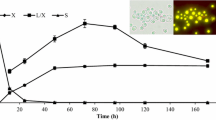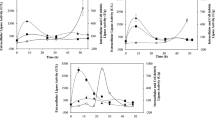Abstract
Coconut meal, a waste product left after coconut milk processing, was collected and utilized as raw substrate for biofuel production. Biofuel production was produced via two steps. Biodiesel was first produced from coconut meal’s oil. Afterward, bioethanol was produced by Saccharomyces cerevisiae, using coconut waste after oil extraction as the sole carbon source. In this study, oil extraction methods, including chill and centrifugation, fermentation, and dry processing, were determined. The highest yield was obtained from dry processing (42.2%). The moisture and free fatty acid content of waste coconut oil (WCO) was 0.1% and 0.3–0.5%, respectively. Therefore, WCO was favourable to use as a substrate for biodiesel production. The highest biodiesel yield (98.1%) was observed from an alkali catalyst. Fuel properties of biodiesel from WCO met the biodiesel standard of the USA (ASTM D6751-07) and Europe (EN 14214). Thereafter, solid coconut waste (SCW) after oil extraction was collected and pre-treated using 50% NaOH. Cellulose content (62.1%) significantly increased after alkali pre-treatment. Thereafter, pre-treated SCW was hydrolysed with cellulase derived from Trichoderma viride and Aspergillus niger. Glucose (20.3 g/L) was a major end product in enzymatic hydrolysate. SCW hydrolysate was utilized as fermentation medium without nutritional supplementation. The production of ethanol constantly increased and reached 8.5 g/L (equivalent to 82.4% of theoretical yield) after 60 h.




Similar content being viewed by others
References
Pahl G (ed) (2005) Biodiesel: growing a new energy economy. Chelsea Green Pub Co, Chelsea
Zeng J, Wang X, Zhao B, Sun J, Wang Y (2008) Rapid in situ transesterification of sunflower oil. Ind Eng Chem Res 48:850–856
Su E, You P, Wei D (2009) In situ lipase-catalyzed reactive extraction of oilseeds with short-chained dialkyl carbonates for biodiesel production. Bioresour Technol 100:5813–5817
Lei H, Ding X, Zhang H, Chen X, Li Y, Zhang H, Wang Z (2010) In situ production of fatty acid methyl ester from low quality rice bran: an economical route for biodiesel production. Fuel 89:1475–1479
Fazal MA, Haseeb ASMA, Masjuki HH (2011) Biodiesel feasibility study: an evaluation of material compatibility; performance; emission and engine durability. Renew Sust Energ Rev 15:1314–1324
Balat M (2011) Production of bioethanol from lignocellulosic materials via the biochemical pathway: a review. Energy Convers Manag 52:858–875
Sulaiman S, Abdul Ramanl AA, Aroual MK (2010) Coconut waste as a source for biodiesel production. 2nd International Conference on Chemical, Biological and Environmental Engineering (ICBEE 2010) p 254–256. doi https://doi.org/10.1109/ICBEE.2010.5653534
Bolivar-Telleria M, Turbay C, Favarato L, Carneiro T, de Biasi RS, Fernandes AAR, Santos AMC, Fernands PMB (2018) Second-generation bioethanol from coconut husk. Biomed Res Int 2018:1–20. https://doi.org/10.1155/2018/4916497
Van Dam JEG (2002) Coir processing technologies: improvement of drying, softening, bleaching and dyeing coir fibre/yarn and printing coir floor covering. Technical Paper No. 6, Common Fund Commod, Amsterdam
Serechodchawong P, Sangkharak K (2014) The production of biodiesel and ethanol from pressed coconut. Thaksin J 17:103–110
Karnasuta S, Punsuvon V, Nokkaew R (2015) Biodiesel production from waste coconut oil in coconut milk manufacturing. Walailak J Sci Tech 12:291–298
Sulaiman S, Abdul Aziz AR, Aroual MK (2014) Biodiesel production from solid coconut waste. Adv Environ Biol 8:781–786
Bawalan DD, Chapman KR (2006) Virgin coconut oil production manual for micro- and village-scale processing. In FAO Regional Office for Asia and Pacific. Thammada Press Co Ltd, Bangkok, pp 80. www.fao.org/3/a-lot726e.pdf. Accessed 12 March 2019
Raghavendra SN, Raghavarao KMS (2010) Effect of different treatments for the destabilization of coconut milk emulsion. J Food Eng 97:341–347
Carandang EV (2008) Health benefits of virgin coconut oil explained. Idian Coconut J 1:8–12
Suwanno S, Rakkan T, Yunu T, Paichid N, Kimtun P, Prasertsan P, Sangkharak K (2017) Feasibility of residual oil form palm oil mill effluent and crude lipase from oil palm fruit as a biodiesel substrate and catalyst. Fuel 195:82–87
Ghani NAA, Channip AA, Hwa PCH, Ja’afar F, Yasin HM, Usman A (2018) Physiochemical properties, antioxidant capacities, and metal contents of virgin coconut oil produced by wet and dry process. Food Sci Nutr 6:1298–1306
APCC (Asian Pacific Coconut Community) (2009) APCC standards for virgin coconut oil. Asian and Pacific Coconut Community, Indonesia. http://www.apccsec.org/document/VCNO.PDF. Accessed 12 March 2019
Horwitz DW (2000) Official methods of analysis of AOAC international. AOAC International, Gaithersburg
Blinova L, Fiala J, Balog K (2014) Biodiesel production from waste cooking oil in laboratory scale. Appl Mech Mater 448-453:1656–1659
American Oil Chemists' Society, Firestone D (2009) Official methods and recommended practices of the AOCS. Urbana, Ill: AOCS
Riguady J, Klesney SP (1992) Standard methods for the analysis of oils, fats, and derivatives. Nomenclature of organic chemistry, IUPAC, 7th edn. Pergamon Press, Oxford
Bueso F, Moreno L, Cedeno M, Manzanarez K (2015) Lipase-catalyzed biodiesel production and quality with Jatropha curcas oil: exploring its potential for Central America. J Biol Eng 9:12–18
Schwab AW, Bagby MO, Freedman B (1987) Preparation and properties of diesel fuels from vegetable oils. Fuel 66:1372–1378
Miller GL (1959) Use of dinitrosalicylic acid reagent for determination of reducing sugar. Anal Chem 31:426–428
Foyle T, Jenning L, Mulcahy P (2007) Compositional analysis of lignocellulosic materials: evaluation of methods used for sugar analysis of waste paper and straw. Bioresour Technol 98:3026–3036
Grohmann K, Himmel M, Rivard C, Tucker M, Baker J, Torget R, Graboski M (1984) Chemical-mechanical methods for the enhanced utilization of straw. Biotechnol Bioeng symp 14:137–157
Sangkharak K (2011) Optimization of enzymatic hydrolysis for ethanol production by simultaneous saccharification and fermentation of wastepaper. Waste Manag Res 29:1134–1144
Cabral MMS, de Souza Abud AK, de Farias Silva CE, Almeida RMRG (2016) Bioethanol production from coconut husk fiber. Cienc Rural 46:1872–1877
Jeihanipour A, Taherzadeh MJ (2009) Ethanol production from cotton-based waste textiles. Bioresour Technol 100:1007–1010
Gouveia ER, do Nascimento RT, Souto-Maior AM, de Moraes Rocha GJ (2009) Validation of methodology for the chemical characterization of sugar cane bagasse. Quim Nova 32:1500–1503
Agu RC, Amadife AE, Ude CM, Onya A, Ogu EO, Okafor M, Zejiofor E (1997) Combined heat treatment and acid hydrolysis of cassava grate waste (CGW) biomass for ethanol production. Waste Manag 17:91–96
Oseni NT, Fernando WMADB, Coorey R, Gold I, Jayasena V (2017) Effect of extraction techniques on the quality of coconut oil. Afr J Food Sci 11:58–66
Nour AH, Mohammed FS, Yunnus RM, Arman A (2009) Demulsification of virgin coconut oil by centrifugation method: a feasibility study. Int J Chem Technol 1:59–64
Ruan C, Xing W, Ja TDS (2012) Potential of five plants growing on unproductive agricultural lands as biodiesel resources. Renew Energ 41:191–199
Lam MK, Lee KT, Mohamed AR (2010) Homogeneous, heterogeneous and enzymatic catalysis for transesterification of high free fatty acid oil (waste cooking oil) to biodiesel: a review. Biotechnol Adv 28:500–518
Sharma YC, Singh B (2008) Development of biodiesel from karanja, a tree found in rural India. Fuel 67:1740–1742
Talha NS, Sulaiman S (2016) Overview of catalysts in biodiesel production. J Eng Appl Sci 11:439–448
Leung DYC, Wu X, Leung MKH (2010) A review on biodiesel production using catalyzed transesterification. Appl Energy 87:1083–1095
Rakkan T, Suwanno S, Pichid N, Yunu T, Klomklao S, Sangkharak K (2017) Optimized synthesis method for transesterification of residual oil from palm oil mill effluent and lipase from Pacific white shrimp (Litopenaeus vannamei) hepatopancreas to environmental friendly biodiesel. Fuel 209:309–314
Kuepethkaew S, Sangkharak K, Benjakul S, Klomklao S (2017) Optimized synthesis of biodiesel using lipase from Pacific white shrimp (Litopenaeus vannamei) hepatopancreas. Renew Energy 104:139–147
Mutsumoto T, Samukawa S, Kaieda M, Ueda M, Tanaka A, Fukuda H, Kondo A (2001) Yeast whole-cell biocatalyst constructed by intracellular overproduction of Rhizopus oryzae lipase is applicable to biodiesel fuel production. Appl Microbiol Biotechnol 57:515–520
Vaithanomsat P, Apiwatanapiwat W, Chumchuent N, Kongtud W, Sundhrarajun S (2011) The potential of coconut husk utilization for bioethanol production. Kasetsart J Nat Sci 45:159–164
Sangkharak K, Samae WC (2011) Conversion of leafwaste to sugar and ethanol by SHF and SSF fermentation using cellulase from Cellulomonas sp. Int J Adv Biotechnol Res 2:345–349
Moraes MSA (2012) Analysis of products from pyrolysis of Brazilian sugar cane straw. Fuel Process Technol 93:24–43
Sun Y, Cheng J (2002) Hydrolysis of lignocellulosic materials for ethanol production: a review. Bioresour Technol 83:1–11
Huang Y, Krauss G, Cottaz S, Driguez H, Lipps G (2005) A highly acid-stable and thermostable endo-β-glucanase from the thermoacidophilic archaeon Sulfolobus solfataricus. Biochem J 385:581–588
Jannah AM, Asip F (2015) Bioethanol production from coconut fiber using alkaline pretreatment and acid hydrolysis method. Int J Adv Sci Eng Inf Techno 5:320–322
Soares J, Demeke MM, Van de Velde M, Kerstens D, Sels BF, Verplaetse A, Fernandes AAR, Thevelein JM, Fernandes PMB (2017) Fed-batch production of green coconut hydrolysates for high-gravity second generation bioethanol fermentation with cellulosic yeast. Bioresour Technol 224:234–242
Soares J, Demeke MM, Foulquie-Moreno MR, Van de Velde M, Verplaetse A, Fernandes AA, Thevelein JM, Fernandes PM (2016) Green coconut mesocarp pretreated by an alkaline process as raw material for bioethanol production. Bioresour Technol 216:744–753
Ding TY, Hii SL, Ong LGA (2012) Comparison of pretreatment strategies for conversion of coconut husk fiber to fermentable sugars. Bioresour Technol 7:1540–1547
Goncalves FA, Ruiz HA, Dos Santos ES, Teixeira JA, De Macedo GR (2015) Bioethanol production from coconuts and cactus pretreated by autohydrolysis. Ind Crop Prod 77:1–12
Dien BS, Cotta MA, Jeffries TW (2003) Bacteria engineered for fuel ethanol production: current status. Appl Microbiol Biotechnol 63:258–266
Zabed H, Faruq G, Sahu JN, Azirun MS, Hashim R, Boyce AN (2014) Bioethanol production from fermentable sugar juice. Sci Word J 957102, 11 pages
Reddy V, Sang-Arun J (2011) Promoting coconut-based agro-ecosystem and efficient product utilization for augmenting on-farm income, improving quality of environment and conserving natural resources. Occasional paper. IGES, 25 pages
Funding
This work was supported by the Department of Chemistry, Faculty of Science, Thaksin University (Research project grant) and the Thailand Research Fund (TRF) Grant for Researcher (project number RSA 6180066 and RTA6080010).
Author information
Authors and Affiliations
Contributions
Kanokphorn Sangkharak designed the experiment, conducted research work, compiled data and wrote the manuscript. Kamolphan Chookun conducted research work pertaining to bioethanol, Jutamas Numreung conducted research work pertaining to biodiesel, and Poonsuk Prasertsan is mentor.
Corresponding author
Ethics declarations
Conflict of interest
The authors declare that they have no conflict of interest.
Ethical approval
This article does not contain any studies with human participants performed by any of the authors.
Additional information
Publisher’s note
Springer Nature remains neutral with regard to jurisdictional claims in published maps and institutional affiliations.
Rights and permissions
About this article
Cite this article
Sangkharak, K., Chookhun, K., Numreung, J. et al. Utilization of coconut meal, a waste product of milk processing, as a novel substrate for biodiesel and bioethanol production. Biomass Conv. Bioref. 10, 651–662 (2020). https://doi.org/10.1007/s13399-019-00456-8
Received:
Revised:
Accepted:
Published:
Issue Date:
DOI: https://doi.org/10.1007/s13399-019-00456-8




